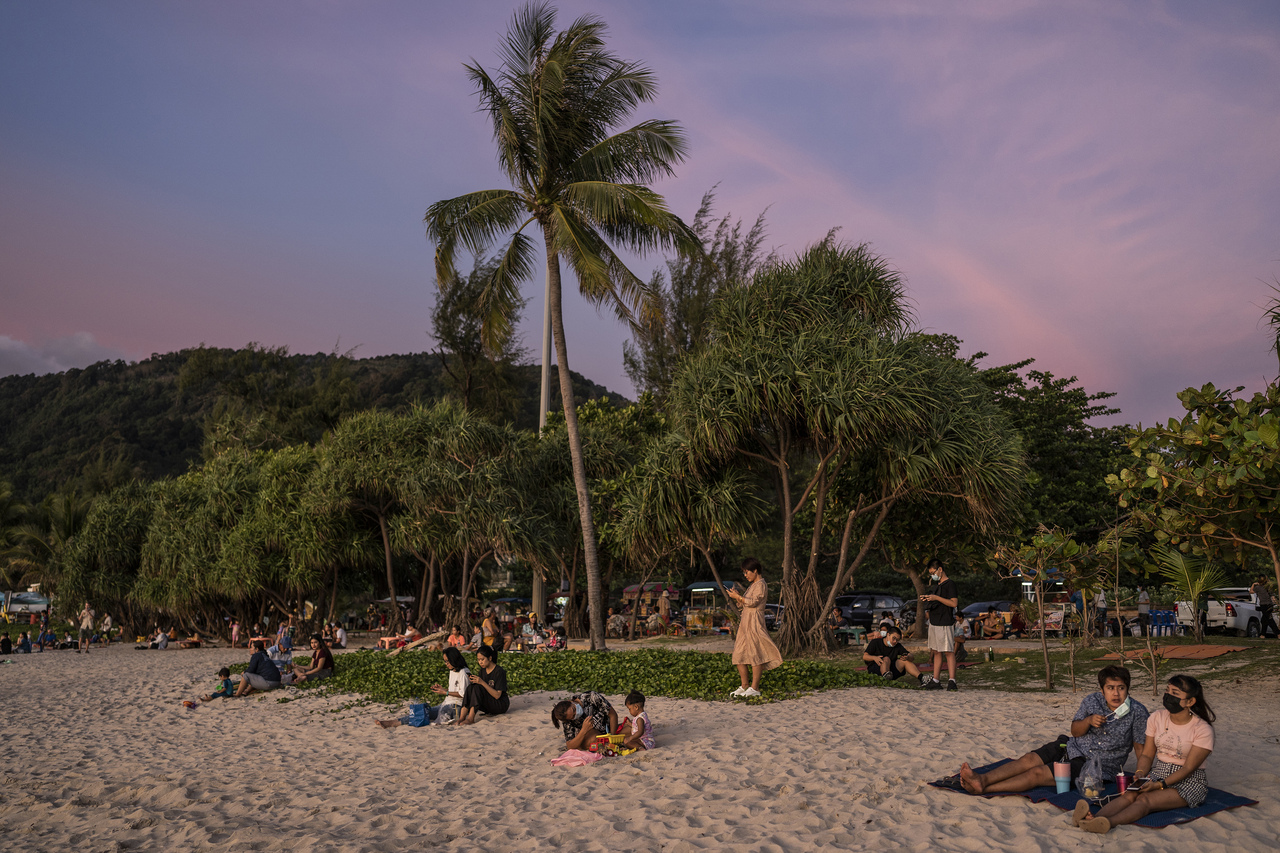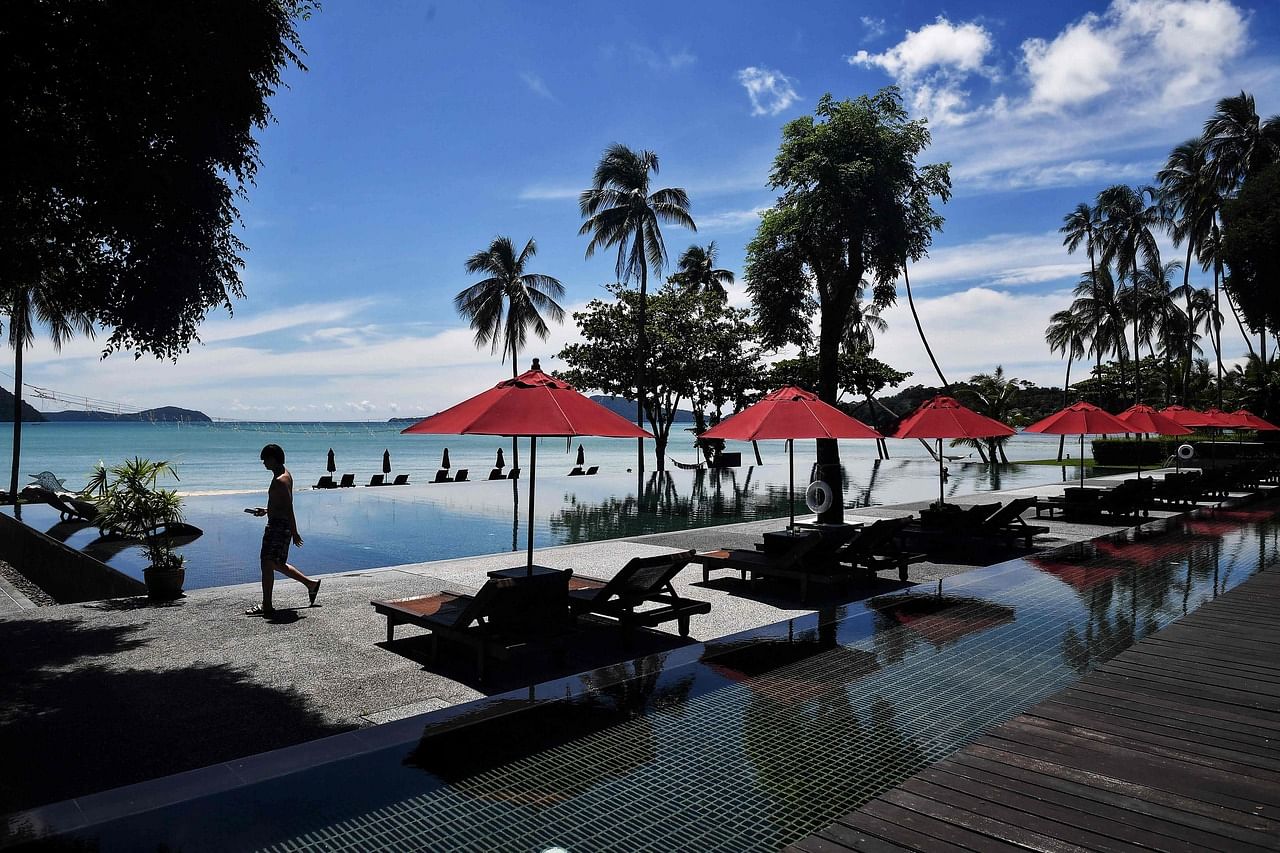Thailand's Covid-19 quarantine-island experiment yields modest results
Sign up now: Get insights on Asia's fast-moving developments

The Phuket Sandbox programme effectively turned Thailand's largest island into a quarantine zone for overseas tourists who were fully vaccinated.
PHOTO: NYTIMES
PHUKET, THAILAND (NYTIMES) - Three months ago, with great fanfare, Thailand began a campaign to start reviving its crucial tourism industry by letting visitors who follow strict Covid-19 protocols roam freely on the resort island of Phuket.
The so-called Phuket Sandbox programme effectively turned Thailand's largest island into a quarantine zone for overseas tourists who were fully vaccinated and had negative test results. If they continued to test negative for seven days, they could visit certain other islands; after 14 days, they could go anywhere in Thailand.
Roughly three months in, the campaign has drawn about 41,000 people, far short of the government's goal of 100,000 in the first 90 days. Many have been residents returning from abroad, not tourists. Phuket had nearly 10 million international visitors in 2019, according to industry groups.
Still, hotel operators and small business owners say the programme has helped the ravaged local economy, and other South-east Asian countries with resort islands are considering emulating it.
"I see the Sandbox as far, far better than nothing because at least there are employees who are working again," said Kanyaphak Lertjaraspong, who sells tour packages in Patong, a beach town at the heart of Phuket's normally rowdy party scene. "At least they have some income."
Indonesia's tourism minister, Sandiaga Uno, told reporters last week that a similar programme could be designed for the island of Bali, Indonesia's largest tourist spot. Bali has had a recent decline in Covid-19 cases, and Indonesia is hoping to open it to foreign visitors as early as this month.
"With the better situation now in Bali, we are discussing whether to adopt this," Sandiaga said.
On Friday (Oct 1), some restrictions were eased for Bangkok and other hard-hit areas. A curfew was pushed back by an hour, to 10 pm, and fitness centers, beauty salons, massage and tattoo parlors, libraries, museums and movie theaters were allowed to reopen.
On Phuket, some of the programme's rules have also been eased, which officials hope will lead to more visitors. On Friday, the maximum required stay on the island was reduced to seven days, from 14.
Just two Covid-19 tests are now required during that time, and vaccinated visitors from any country are welcome, not just from places deemed low-risk. And Phuket's restaurants can sell alcohol again.
In Patong, once-boisterous streets have largely been deserted for months. Enterprising vendors have taken over the street fronts of empty nightclubs to sell fruit, clothing or other wares.
But on Friday evening, street life seemed to be seeping back. Though bars were still forbidden to serve alcohol, some did so anyway, selling it to customers in paper or plastic cups.

The Phuket Sandbox program effectively turned Thailand's largest island into a quarantine zone for overseas tourists who were fully vaccinated.
PHOTO: AFP
Phuket has its own international airport and is connected to the Thai mainland by a single bridge. That makes it possible to screen all travelers, whether they are arriving by road or air.
Officials acknowledge that Phuket Sandbox's complicated application process has been a deterrent. Visitors have to submit numerous documents, pay in advance for coronavirus testing and provide proof of Covid-19 insurance. Some may also be wary of the requirement that they install an app on their phone that lets health officials track their movements.
Thailand's prime minister, Prayuth Chan-ocha, pledged to improve the application process in a Facebook post Friday. He called the programme a success and said it would be expanded, adding that it had not caused Covid-19 to spread in Phuket. About 125 Sandbox visitors have tested positive.
Another problem with the programme has been the policy requiring that travelers who test positive, or who are traveling with someone who tests positive, be transferred from their hotel to a health care facility and kept in strict quarantine for up to 14 days at their own expense. This has led to the mandatory quarantine of tourists who were sitting near an infectious passenger on their flight to Phuket.

A worker tidies up sun loungers on the beach in Patong, Phuket, on Oct 1, 2021.
PHOTO: NYTNS
Other nearby countries besides Indonesia have been watching the Phuket experiment to see if something similar could work for their own beleaguered tourism industries. Malaysia opened the island of Langkawi to domestic tourists in mid-September as a first step toward receiving foreign visitors. Vietnam had hoped to welcome foreign tourists to the island of Phu Quoc this month, but was forced to delay the opening because of a vaccine shortage.
Thailand, which also has a limited vaccine supply, has made it a priority to inoculate people living in tourist areas like Phuket and Koh Samui, another popular tourist island, to accelerate their reopenings.
In Phuket, more than 83% of the population have had two vaccine doses, according to government figures. But many of those were Sinovac, the Chinese-made vaccine that has been less effective than others against the delta variant.
To remedy this, the government has begun giving boosters of the Astra-Zeneca vaccine to people who received Sinovac, using a fifth of the normal dose to conserve the limited supply.
Many of the Phuket Sandbox participants have been not tourists, but residents of Thailand returning from overseas travel. For them, a stay in Phuket has been a nice alternative to mandatory quarantine in a Bangkok hotel room.

A bar in Phuket on Oct 1, 2021.
PHOTO: NYTNS
Anthony Lark, president of the Phuket Hotel Association, called the programme "an absolute lifeline not just for hotels and hotel owners, but for thousands of staff whose only income is based on tourism."
In Phuket Town, the island's provincial capital, colorful, 19th-century shop houses have long drawn visitors to the historic Old Town district. Business there collapsed during the pandemic but is slowly coming back, said Piangpen Thampradit, owner of the Phuketique Coffee Bar.
"My customers who rely on tourism can get their businesses moving and we can see the money circulating," she said.
Large resort hotels have been among the programme's biggest beneficiaries, while some small-business owners say they have yet to see much benefit. Piangpen, who closed one of her two shops for lack of customers, said that her initial expectations were low, but that she was now more hopeful.
"I am optimistic about the programme," she said. "It is far better than doing nothing. For us small businesses, it will take a while to receive the benefits. We are waiting for that time."


